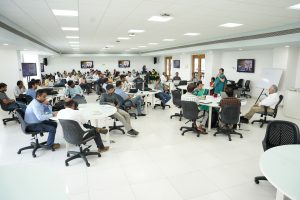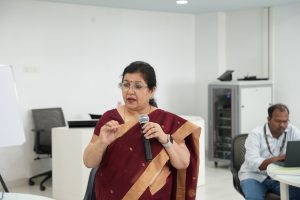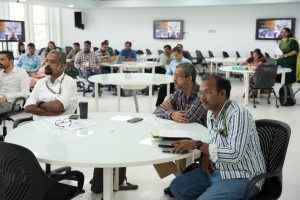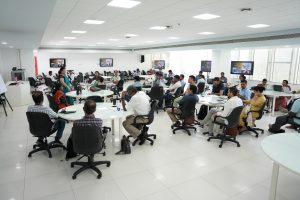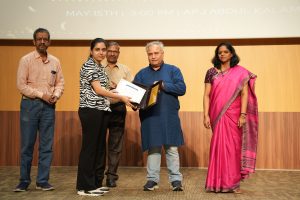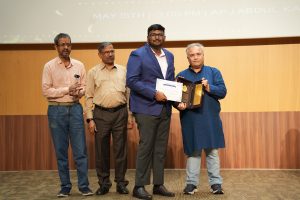NITTTR and SRM AP Collaborate for Trainer Programme on Outcome-Based Education
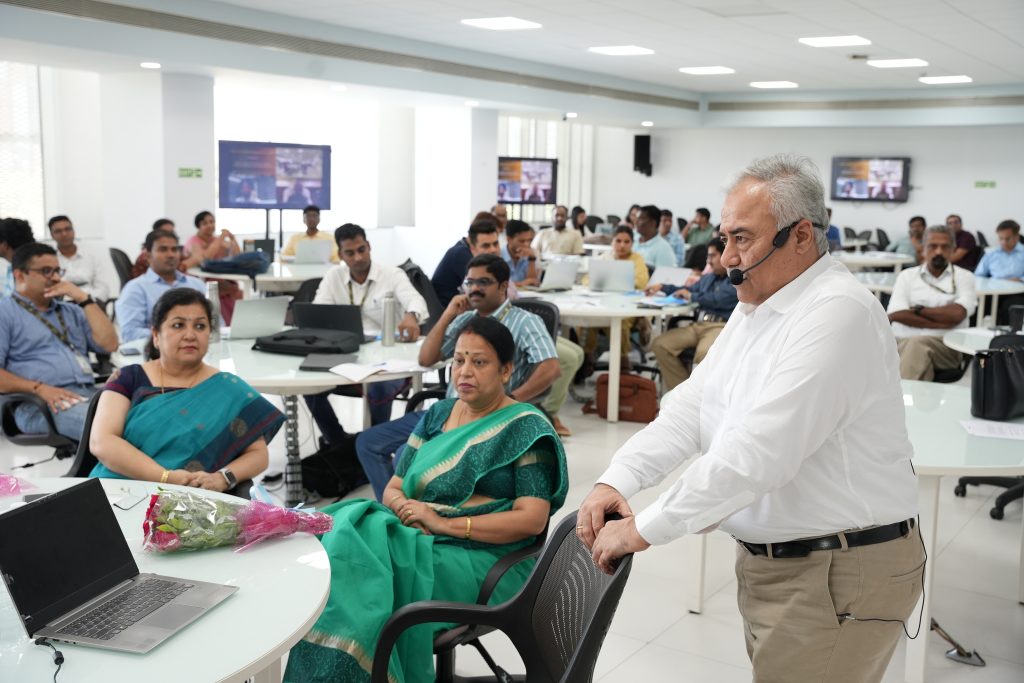
SRM University-AP organised a “Train to Trainer Programme on Outcome-Based Education (OBE)” for the faculty of the varsity to ensure a comprehensive understanding and implementation of OBE principles across all academic programmes. The five-day programme, initiated on May 20, 2024, was conducted by trainers from the National Institute of Technical Teachers’ Training Research (NITTTR), Chandigarh. The programme was inaugurated in the presence of Prof. Bhola Ram Gurjar, Director of NITTTR (joined virtually), Prof. Maitreyee Dutta, Professor and Head of Information Management and Emerging Engineering Department, NITTTR, Dr Meenakshi Sood, Associate Professor CDC, NITTTR, Prof. Manoj K Arora, Vice Chancellor, SRM University-AP, Deans of all schools, Directors and Faculty members of the institute.
The programme comprised customised training sessions and modules that covered various aspects of OBE framework design such as Implementation, Challenges, Strategies, Best Practices, Case Studies, Student Testimonials, Impact Analysis, Future Scope, etc. Trainers from NITTTR – Prof. Rama Krishna, Prof. Maitreyee Dutta, Prof. Sandeep Singh Gill, Dr Meenakshi Sood, Dr Balwindar Singh, Er Amandeep Kaur delivered the sessions.
A total of 40+ faculty members were chosen to receive training from the NITTTR Team. These faculty will be the programme-wise coordinators and master trainers, who will then train the rest of the faculty in their respective programmes and departments. This systematic training ensured that every faculty member of the university had a comprehensive and in-depth understanding of OBE and its impact on the present education system.
- Published in Departmental News, News
A New Chapter Begins: Welcoming the Vibrant Leaders of Student Council 2024-25!
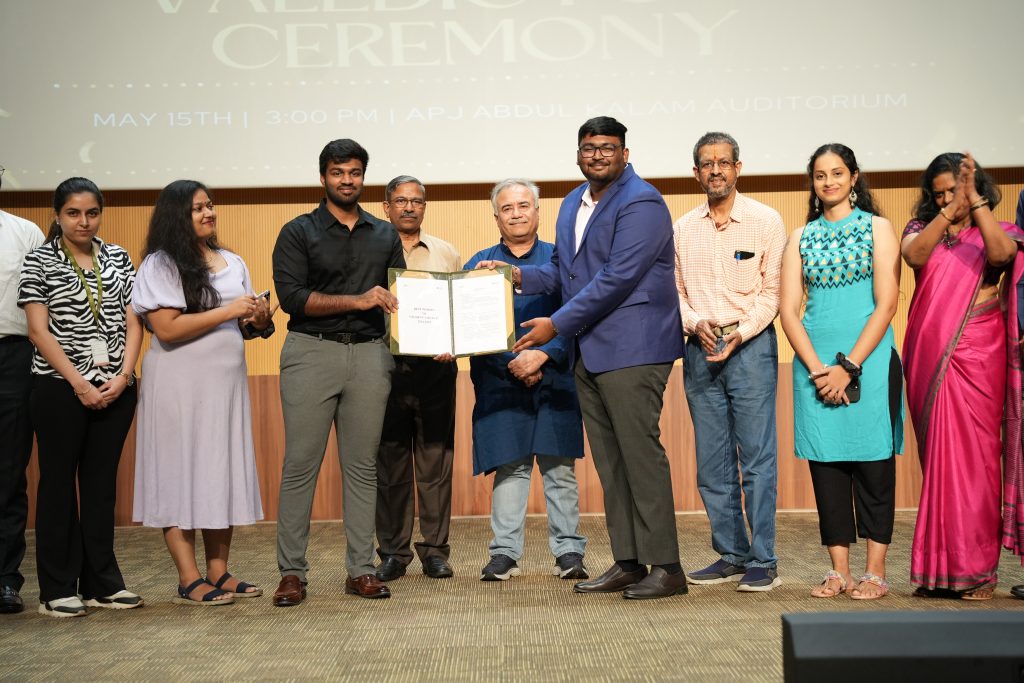
The Directorate of Student Affairs hosted a wonderful Valedictory Ceremony on May 15, 2024, marking a momentous occasion as the university bid farewell to the outgoing Student Council and welcomed the new core team.
The campus bid adieu to Preetam Vallabhaneni, Niruktha Vadlamudi, Sanjana Maini, and Laxman Bankupalle, the charismatic heads of the previous Student Council and applauded them for their phenomenal leadership. Their dedication to managing student needs, organising fests, and ensuring a vibrant campus life has set an incredible standard.
The baton has now been passed to a dynamic new team: Laxman Bankupalle, Nivedha Sriram, Ankith Reddy, and Rishabh Ranjan Ishwar, who will serve as the President, Vice President, General Secretary and Treasurer of Student Council 2024-25. The vibrant team is ready to take the reins and elevate the student experience even further. “With their remarkable capabilities, we are confident that they will continue to strengthen the bridge between the student community and university management”, stated Vice Chancellor Prof. Manoj Arora, as he welcomed the new student leaders. Associate Director-Student Affairs, Ms Revathi B exclaimed, “A new team brings in new energy, a new chapter”, as she perfectly captured the spirit of this transition.
The ceremony also recognised the outstanding contributions of all clubs, societies and committee members, SC members, NSS, CESR (Corporate Engagement and Social Responsibilities), sports teams, and volunteers. The event was graced by the presence of our esteemed Registrar, Dr R Premkumar, CFAO Ms Suma Nulu, Deans, Directors, Faculty and Students of the varsity.
- Published in Departmental News, News, student affairs news
Innovative Wind Turbine System Patent Awarded to Dr Goutam Rana and Team
 In a significant advancement for sustainable energy technology, the Indian Patent Office Journal has officially granted a patent for the “Mini magnetically levitated wind turbine system for power generation.” This groundbreaking invention, bearing Application Number: 202241051560, is the brainchild of Dr Goutam Rana, Assistant Professor in the Department of Electronics and Communication Engineering.
In a significant advancement for sustainable energy technology, the Indian Patent Office Journal has officially granted a patent for the “Mini magnetically levitated wind turbine system for power generation.” This groundbreaking invention, bearing Application Number: 202241051560, is the brainchild of Dr Goutam Rana, Assistant Professor in the Department of Electronics and Communication Engineering.
Dr Rana, along with his dedicated team of B. Tech ECE students—Mr Vybagula Sai Vamsi, Mr Moparthi Teja, Mr Indrakanty Satwik, and Mr Pidikiti Venkata Abhinash have developed a system that promises to revolutionise how we harness wind energy. The turbine’s miniaturised and magnetically levitated design allows for efficient power generation with minimal mechanical friction, leading to a longer lifespan and reduced maintenance costs.
The team’s innovation aligns with global efforts to transition to renewable energy sources and showcases the potential of academic research in contributing to real-world challenges. The patent grant not only recognises the technical ingenuity of the invention but also underscores the collaborative spirit of the students and faculty at the institution.
Abstract:
Due to the increasing demand and supply gap, in the electrical energy system, wind energy is coming out as an alternative form of clean-with zero-carbon footprint renewable energy sources for power generation. The same is true for hydrocarbon-based fuels whose resources are limited and the contribution of vehicular pollution is also raising concerns in every-degrading the air quality index (AQI) of Indian cities. The electric and hybrid vehicles thus emerging fast as an alternative but often being hindered by the unavailability of proper charging infrastructures on roads.
The current invention is aimed to enable the use of wind turbines for harnessing wind energy and utilize the same to charge batteries of electrical vehicles or hybrid vehicles. The major challenges that have prevented the use so far are mainly two viz. low air flow and larger air drag. To address low airflow in normal road conditions in congested city alleys, we demonstrated the use of magnetically levitated Vertical-axis turbines instead of conventional ball-baring-based Horizontal-axis wind turbines. To reduce the air drag the use of vertical axis magnetically levitated wind turbines is a good option since the air drag experienced in the blade unit is not exactly in contact with the car body.
To improve on the drag further we have introduced an array of mini turbine units instead of one big unit which helps in distributing the total drag over a large area and since air can pass easily through small units overall drag experienced will be small. Also, to keep the levitation small, the rotating unit is made lighter with 3D printing perforated PLA material.
The rest of the operation of the system is similar to any wind turbine system i.e. with the help of permanent magnet and coil arrangement we will convert the wind energy (rotor movement) into electrical energy (e.m.f.). Only here instead of one single source, we will generate multiple small sources of induced electrical energy which can then be coupled together and used for charging the battery.
Since the invention uses magnetic levitation, friction is minimal. This helps the rotor to become independent of natural wind flow and use the movement of the vehicle to generate the required torque for the rotor movement. Our invention can be installed in the rooftop space of any vehicle and since it is divided into an array of smaller units, allows the optimum use of available space of the used vehicle. Overall cost and weight are also very minimal. Here, the most practical use case can be the widespread E-rickshaws in India. The choice of the use case is based on the fact of their large presence, longer run hours, and limited speed for the runs.
Explanation of the Invention in Layperson’s Terms:
The invention will act as a source of energy and can be used to charge batteries of electric vehicles or hybrid vehicles. The device converts wind energy to electrical energy through mini wind turbine arrays which can be placed on top of the rooftop of the vehicles. The rotor is kept suspended from the stator unit using magnets to eliminate friction. This helps to operate the device without the presence of strong natural wind, it utilizes the movement of the vehicle to generate the necessary rotation. The mini turbine arrays and magnetic suspension help to reduce the effect of wind drag (extra wind replaced by the turbine unit).
Practical Implementation or the Social Implications Associated
The invention is intended to solve a few on-road challenges of Electric Vehicles (EVs). The current invention is:
1. Low cost and one-time investment with zero maintenance charge for an EV
2. The proposed device can act as a secondary power source for the vehicle
3. The proposed device will convert wind energy, thus completely environment-friendly, and with comes with absolutely zero carbon footprint
4. The proposed device can add some extra mileage to the current battery storage as much as it runs.
5. With other renewable sources together a hybrid vehicle can be built which is free of fossil fuel completely.
Future Research Plans:
The current invention is in just proof of concept stage. We are currently working on the following
1. to improve the overall efficacy of the device such that each unit can harness wind energy to its optimal potential. With this, we will try to ensure that the battery gets charged completely (or at least a significant percentage) during each run during the day.
2. We are also working on the numerical study to calculate the actual wind drag with a more optimal design so that we can estimate how many units a certain vehicle will require and what should be the optimal placement scheme to utilize the maximum wind effect.
- Published in Departmental News, ECE NEWS, News, Research News
An Inventive Navigation System for the Visually Impaired
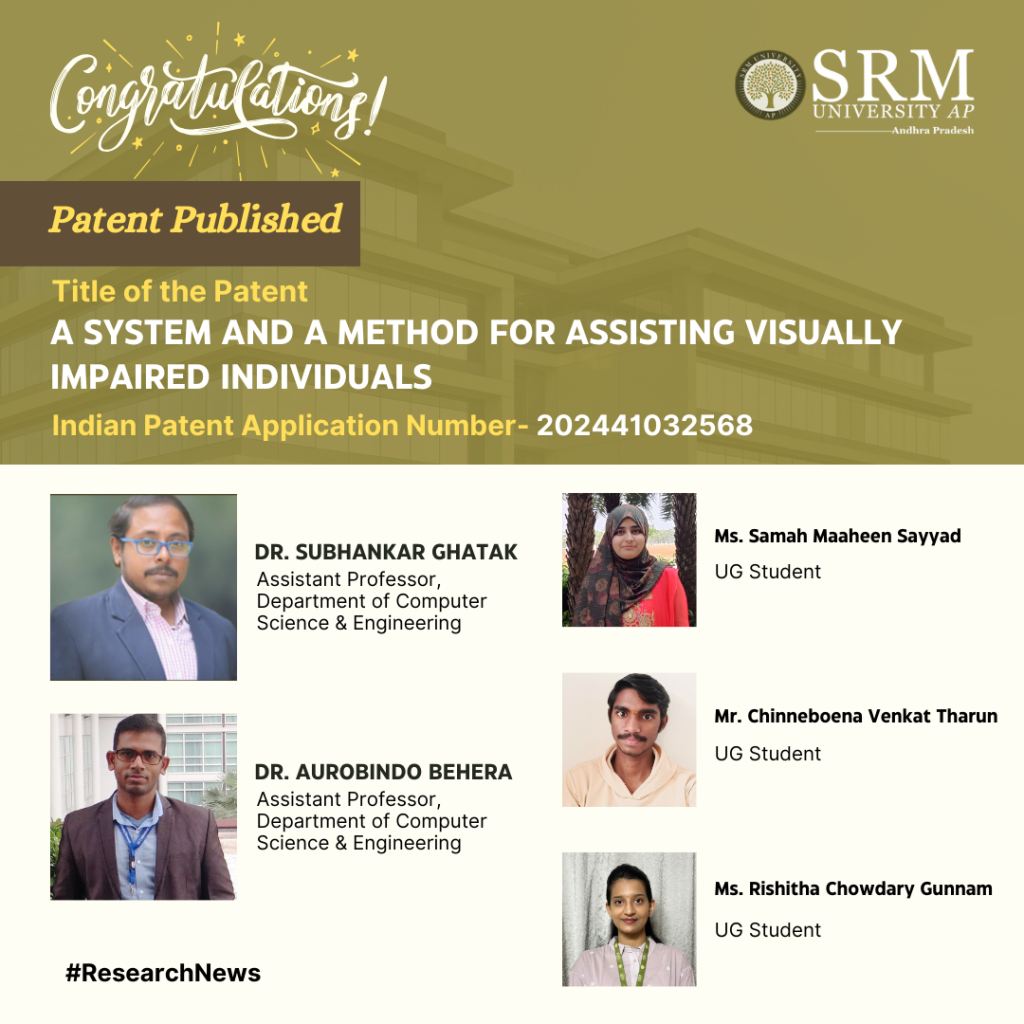
The Department of Computer Science and Engineering is proud to announce that the patent titled “A System and a Method for Assisting Visually Impaired Individuals” has been published by Dr Subhankar Ghatak and Dr Aurobindo Behera, Asst Professors, along with UG students, Mr Samah Maaheen Sayyad, Mr Chinneboena Venkat Tharun, and Ms Rishitha Chowdary Gunnam. Their patent introduces a smart solution to help visually impaired people navigate busy streets more safely. The research team uses cloud technology to turn this visual information into helpful vocal instructions that the users can hear through their mobile phones. These instructions describe things like traffic signals, crosswalks, and obstacles, making it easier for them to move around independently, making way for an inclusive society.
Abstract
This patent proposes a novel solution to ease navigation for visually impaired individuals. It integrates cloud technology, computer vision algorithms, and Deep Learning Algorithms to convert real-time visual data into vocal cues delivered through a mobile app. The system employs wearable cameras to capture visual information, processes it on the cloud, and delivers relevant auditory prompts to aid navigation, enhancing spatial awareness and safety for visually impaired users.
Practical implementation/Social implications of the research
The practical implementation of the research involves several key components.
- Developing or optimising wearable camera devices that are comfortable and subtle for visually impaired individuals. These cameras should be capable of capturing high-quality real-time visual data.
- A robust cloud infrastructure is required to process this data quickly and efficiently using advanced computer vision algorithms and deep learning algorithms.
- Design and develop a user-friendly mobile application that delivers processed visual information as vocal cues in real-time. This application should be intuitive, customisable, and accessible to visually impaired users.
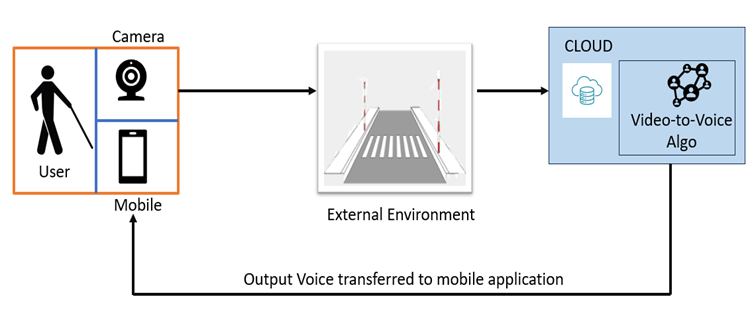
Fig.1: Schematic representation of the proposal
The social implications of implementing this research are significant. We can greatly enhance their independence and quality of life by providing visually impaired individuals with a reliable and efficient navigation aid. Navigating city environments can be challenging and hazardous for the visually impaired, leading to increased dependency and reduced mobility. The research aims to mitigate these challenges by empowering users to navigate confidently and autonomously. This fosters a more inclusive society where individuals with visual impairments can participate actively in urban mobility, employment, and social activities.
In the future, the research cohort plans to further enhance and refine technology to better serve the needs of visually impaired individuals. This includes improving the accuracy and reliability of object recognition and scene understanding algorithms to provide more detailed and contextually relevant vocal cues. Additionally, they aim to explore novel sensor technologies and integration methods to expand the capabilities of our system, such as incorporating haptic feedback for enhanced spatial awareness. Furthermore, we intend to conduct extensive user testing and feedback sessions to iteratively improve the usability and effectiveness of our solution. This user-centric approach will ensure that our technology meets the diverse needs and preferences of visually impaired users in various real-world scenarios.
Moreover, the team is committed to collaborating with stakeholders, including advocacy groups, healthcare professionals, and technology companies, to promote the adoption and dissemination of this technology on a larger scale. By fostering partnerships and engaging with the community, they can maximise the positive impact of their research on the lives of visually impaired individuals worldwide.
- Published in CSE NEWS, Departmental News, News, Research News


